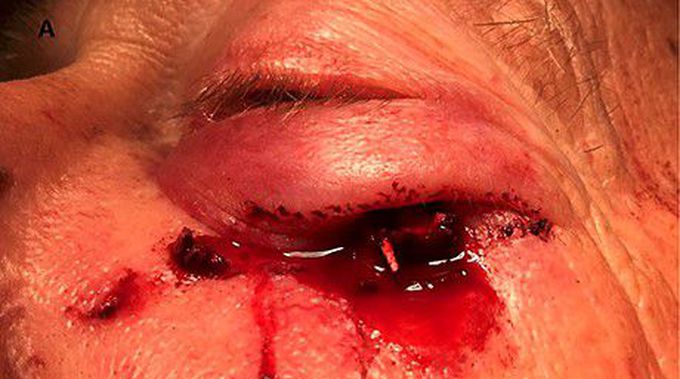


Twig in the Eye: A Case Report
Trans-orbital trauma and intra-sphenoidal trauma are exceptionally challenging to manage due to their close proximity with various important anatomical structures. Particularly important are optic nerve, the central nervous system, the globe, and the ophthalmic internal carotid artery. A journal reported a case of trans-orbital plus sphenoid sinus trauma secondary to fall on a branch of tree that resulted in penetrating trauma. A 75 years old, unidentified gentleman was walking on a sidewalk when he tripped and fell on the branch of tree. This branch was lodged in the orbit and the sphenoid sinus on the left side and was visible above the left cheek (as shown in the image). The examination of eye was hindered due to conditions like edema, superior dislocation of globe and mechanical ptosis. Vision was severely disturbed in the left eye. Radiologic imaging revealed a 7 cm x 0.6 cm wooden foreign object penetrating the sphenoid sinus. The distance between internal carotid artery and the foreign body was approximately 6 mm. the globe and the optic nerve were not damaged. Multidisciplinary surgical team was appointed to manage the trauma after preliminary treatment. The foreign body was removed via endoscopy guided by CT. Several splinters were also identified and extracted. The skin was then sutured. Fundoscopy and slit lamp examination was unremarkable. The key to successful management of such critical trauma is immediate admission to level 1 trauma center followed by treatment by team of highly skilled head and neck surgeons, ENT surgeons, ophthalmologists, and audiologists. Appropriate investigations and proficient trauma surgeons ensure fast recovery along with low risk of development of subsequent complications. Source: Penetrating Orbital Sphenoid Sinus Trauma with a Wooden Stick: A Challenging Case Report https://www.karger.com/Article/FullText/510019 (Image taken from: https://www.karger.com/Article/FullText/510019)
Is the eye or vision savable at this point?
in this patient's case, color vision was disturbed but follow-up showed improvement in accomodation
This is a case of several diagnosises and is quite uncommon to have all optic neuritis neurological possible frontal occitable love twitching and jerking and possibly a different form of seizures also in this retrobulbar surgery retroblastoma cornea tear is possible also futuristic chataracs ever body says that it could also cause by traveling too the spinal cavity celiac or spondylosis or scoliosis

